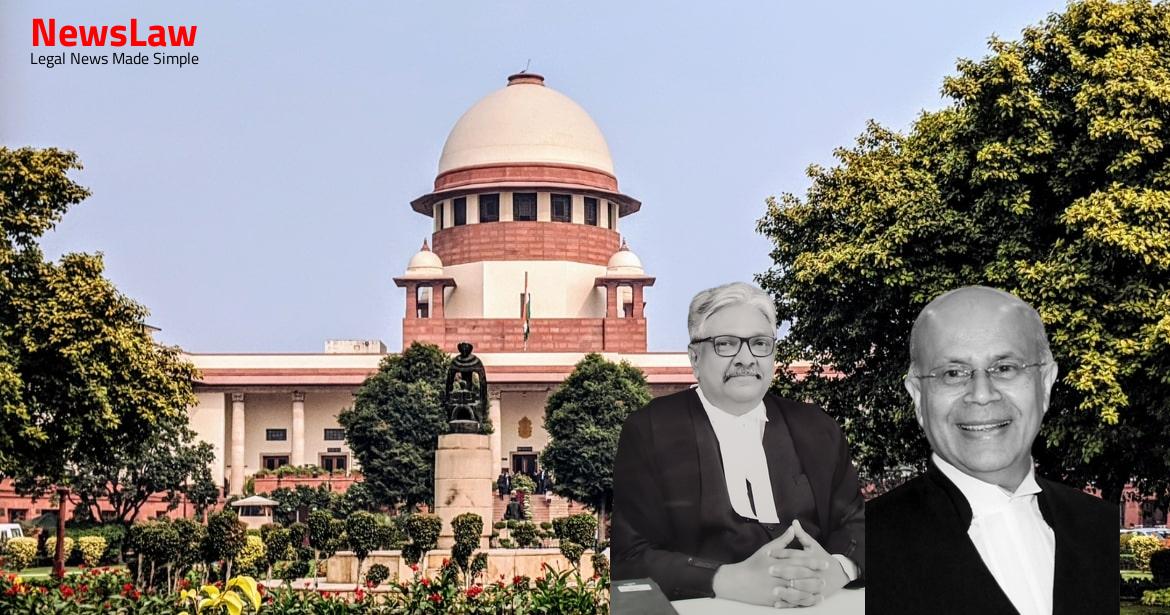Explore the complexities of judicial review concerning procedural time limits in disciplinary proceedings. The Court’s intricate legal analysis and interpretation of time constraints play a pivotal role in ensuring justice and procedural fairness in legal matters. This case summary navigates through the legal intricacies and the significance of complying with time limits for a just legal system.
Facts
- The Disciplinary Authority served the respondent with a removal from railway service penalty.
- The Appellate Authority modified the penalty to downgrading the pay of the respondent.
- The Tribunal pointed out flaws in the disciplinary proceedings conducted by the Disciplinary Authority.
- The respondent did not challenge the initial order in appeal, but filed a revision petition against the modified penalty.
- The Revisional Authority failed to acknowledge the nullity of the Disciplinary Authority’s order due to exceeding time limits.
- The Tribunal dismissed the respondent’s application due to lack of appeal to the Appellate Authority, missing the nullity of the Disciplinary Authority’s order.
- All orders passed by the Disciplinary Authority, Appellate Authority, and Revisional Authority were quashed and set aside.
- The Tribunal showed displeasure towards the Disciplinary Authority for not respecting its orders.
- The disciplinary proceedings were automatically quashed as they exceeded the prescribed time limit.
- The Superior Authority was urged to take note of the Disciplinary Authority’s conduct.
- The matter required reevaluation by the Disciplinary Authority.
- A major penalty charge-sheet was issued against the respondent based on an enquiry report.
- The respondent challenged the judgements and orders through the current appeal before the High Court.
- The High Court disapproved the Tribunal’s order regarding the nullity of the remitted proceedings in the disciplinary enquiry.
- The High Court directed reinstatement of the respondent with 50% back wages from the date of removal.
- Reinstatement instructions were issued, and the factual aspects of the charges in the disciplinary proceedings were not extensively discussed.
- The High Court observed that the proceedings conducted by the Disciplinary Authority beyond the time prescribed were considered a nullity in the eyes of the law.
- The High Court held that since the Disciplinary Authority did not complete the disciplinary proceedings within the time ordered by the Tribunal, the subsequent actions taken were illegal and improper.
- The Tribunal highlighted that the proceedings would only abate if specifically directed in the order, which was not the case in this situation.
- The Tribunal directed the Appellate Authority to consider any appeal filed by the respondent against the order dated 17.02.2011 within one month in the interest of justice.
- The High Court set aside the order of the Tribunal dated 21.06.2013 and also quashed the order dated 17.02.2011 passed by the Disciplinary Authority as illegal and nullity in the eyes of the law.
- The High Court emphasized that the Disciplinary Authority had no jurisdiction or authority to continue the proceedings beyond the established time by the Tribunal.
Also Read: Court’s Jurisdiction in Re-appraising Arbitrator’s Findings
Arguments
- Disciplinary Authority failed to decide the matter within two months as mandated by the Tribunal’s previous order.
- Application seeking extension of time was dismissed by the Tribunal.
- The order passed by the Disciplinary Authority after the stipulated period expired and no extension was granted is considered null and void in the eyes of the law.
- The High Court was unjustified in reversing the order of the Tribunal dated 21.06.2013.
- The ASG argued that ignoring the gravity of charges and focusing on technical grounds, the High Court’s decision was incorrect.
- The Tribunal’s earlier order did not signify that the proceedings would end after two months, making the High Court’s nullity ruling unjustified.
- The Tribunal noted that the respondent did not prefer the statutory appeal, even when dismissing the Original Application, providing the respondent with the liberty to do so.
- The learned counsel contends that the view taken by the High Court is justified and should not be interfered with.
- Courts and Tribunals have the inherent power to set time limits for conducting proceedings.
- Non-compliance with time limits set by the Court or Tribunal can lead to the proceedings being concluded.
Also Read: Contrary Directions in Issuance of Letter of Intent
Analysis
- The High Court’s conclusion that the proceedings had abated or become nullity due to the expiry of the time period set by the Tribunal was not endorsed.
- The two-month period set by the Tribunal was for expediting proceedings, not a strict mandate with fatal consequences upon expiry.
- The Disciplinary Authority’s decision beyond the two-month period was still valid as the Tribunal had not extended the time.
- The High Court’s interpretation ignored the procedural nature of the time period and was in conflict with the case’s substance.
- The Tribunal’s power to enlarge time for a particular act was not based on merits but on procedural grounds.
- The High Court erroneously treated the proceedings as null and void, contrary to fundamental principles of procedural time limits.
- Conditional orders are often seen as deterrents against dilatory tactics by litigants or laxity by the Adjudicating Authority.
- The Court has the power to extend the time even if it had initially set a peremptory period.
- In the case of Mahanth Ram Das v. Ganga Das (1961) 3 SCR 763, the Court examined a peremptory order related to payment of deficit court fees where an application to extend the time was rejected after the expiry of the originally fixed deadline.
- The Court emphasized that such orders are not set in stone and can be modified to address specific circumstances, with examples cited where Courts have bent their practice to accommodate such situations and revive suits or proceedings.
- Courts have the flexibility to adapt their practices to ensure justice prevails, even after passing final orders.
- The High Court should not have interfered with the order passed by the Tribunal on 21.06.2013.
- The order passed by the Tribunal should be restored with consequential directions.
- The High Court’s unnecessary strictures against the Disciplinary Authority were unwarranted.
- The High Court’s displeasure was based on a wrong premise regarding the proceedings being rendered nullity.
- Even if the proceedings were deemed improper, there was no justification for criticizing the Disciplinary Authority’s handling of the case.
Also Read: Application for Stay in Civil Suit Rejected: Court’s Legal Analysis
Decision
- The order dated 14.08.2015 is made absolute, leaving all contentions of parties to be examined by the Appellate Authority.
- 50% of back wages are to be paid to the petitioner.
- The impugned order dated 30.08.2013 is set aside and the order dated 21.06.2013 passed by the Tribunal is restored.
- The respondent is permitted to prefer an appeal against the order dated 17.02.2011 before the Appellate Authority.
- No order as to costs is given.
- Pending applications are disposed of.
- Payment of 50% back wages and furnishing security of immovable property by respondent mentioned in the order dated 14.08.2015.
- The appeal is allowed as per the indicated extent and manner.
- Back wages to be paid from 17th February, 2011 till the date of reinstatement.
- Appellate Authority to consider respondent’s appeal within 30 days from receipt of this order.
- Security furnished by the respondent is discharged.
Case Title: UNION OF INDIA AND ORS. Vs. SHARVAN KUMAR (2022 INSC 1307)
Case Number: C.A. No.-001942-001942 / 2014



